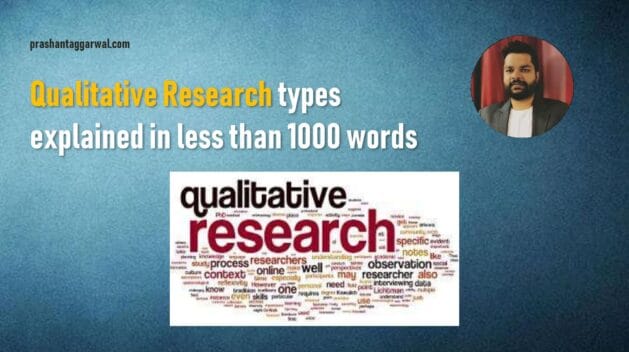Qualitative Research

Qualitative research is a type of research that focuses on explaining the world’s reality through the participants’ perspectives. Also, it is characterized by the researcher’s active involvement when interacting with participants while gathering data in the natural setting. Lastly, in qualitative research, the research study results tend to be subjective because it is affected by the perceptions and opinions of the respondents based on their experiences.
Now that we have understood what qualitative research is, the next question is the different types of qualitative research design.
Qualitative Research Designs
- Case Studies
-
- It requires a long time and in-depth study of Organization or situation or phenomena.
- This type of study is often used to narrow down a very broad field of research into one or a few easy research examples.
- It is also useful for testing whether a specific theory and model applies to the nominal in the real world.
- Example – How their environment influences students’ vocabulary development?
-
- Hypothesis – The environment influences a person’s vocabulary acquisition and development.
- With this in mind, the researcher would interview two different groups of students with the different environment (stream, for example)
- This case study would have multiple observations starting with the beginning of the senior high school years, middle of the senior high school, and the student’s high school years.
- From there, the researchers can compare whether there’s a difference or similarity in terms of conversation expressions used and known vocabulary words between the different groups.
- Based on the results, the researcher should be able to come up with conclusions.
-
- Ethnography
-
- It involves studying a particular cultural group to get a clear understanding of their belief systems and practices.
- It also aims to have a more in-depth understanding of all of the group members’ organizational setup and lifestyle.
- It is also worth noting that ethnography falls under the field of anthropology.
- For example, we will have to study that observes the culture and practice of people living in far-flung areas away from modernization.
-
- With this in mind, the researcher would have observed a group of people living in visiting far-flung areas.
-
- The researchers then typically interact with people through
-
-
- Interviews
- observations
- Immersions
- This kind of practice helps the researchers have firsthand experience of the practice of the group members and obtain firsthand testimonies from the research participants.
- And present accurate reports regarding the research subject since the researcher can interact with them directly and personally.
-
- Since the research involves a particular group of people, the results are context-specific. When you say politics specifically, the findings apply only to those specific people and not the general public.
-
- Phenomenology – It aims to examine the human experience regarding a certain phenomenon. Also, it recognizes that each experience is unique and meaningful.
-
- The objective of phenomenology is to present a live experience of the participants involved in the study.
- Example – We need to recognize the different strategies used by international students to adapt to the new language learning environment.
-
- The researcher would interact with different international students who are studying in a particular country.
- The researcher interacts with the participants and does few interviews, such as focus group discussions or in-depth interviews.
- During these discussions or interviews, the researcher would then be able to identify the different experiences, struggles and adapt strategies used by the participants.
- From there, the researchers would be able to come up with a detailed discussion of the results.
-
- Historical Analysis – The historical analysis involves examining primary documents to make you understand the connection of past events to the present time.
-
- The historical analysis researchers rely on primary sources of historical data.
- For example – The development of the educational system in the Philippines.
-
- With this in mind, the researcher needs to have primary sources of historical data.
- Some examples would be direct accounts of events, Archival data, official documents, personal records and, Eyewitness records.
- Once the researchers can analyze the sources of information, the researcher would then be able to identify how the educational system in the past.
- It’s connected with the educational system in terms of policy changes, Friendships, Teaching strategy, development, and updates in the material used.
-
- Content and Discourse analysis – This type of qualitative research design requires analysis or examination of text or content of the modes of communication. Furthermore, according to public health at Columbia ensues puts it in discourse analysis is conducted for the following reasons.
-
- Identify the intentions, focus, or communication trends of an individual, group, or institution.
- Describe the attitudinal and behavioral responses to communications.
- Reveal the international differences in communication content.
- Reveal the patterns in communication content.
- Determine the psychological or emotional status of the person or group.
- For example – If a researcher wants to determine or understand the language of journalism. He would analyze the different modes of communication, such as journals, articles, and audiovisual materials.
- Based on this analysis, the researcher would then be able to identify how journalistic jargon or the language of journalism has similarities and differences in terms of regular communication jargon.
- Grounded Theory – This occurs when a researcher discovers a new theory to underlie his study at the time of data collection and analysis.
-
- It also explains the main concern of the participants involved in the research.
- Through various means of data collection such as interviews, observations, fieldwork, focus group discussions, and study of artifacts and texts, the researcher would be able to discover an idea that would explain the how and why behind a particular phenomenon.
Summary

There are few other advanced methods like Semiotics which I’ve not covered here intentionally to keep this post simple.
If you found my post useful then do share it with your friends and colleagues. If you have any feedback/questions, you may leave a comment below.

